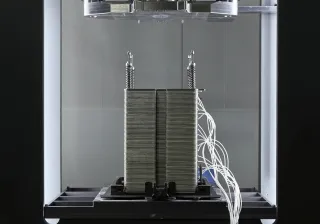Drastic reductions in the carbon dioxide level of the atmosphere are needed to curb climate change. Carbon capture and utilization of captured carbon in new products can play a key role in replacing emission intensive fossil products. Combining low emission electricity with captured CO2 enables production of synthetic e-fuels for direct use by the consumer. The E-fuel research project, coordinated by VTT, has developed a concept for the production of e-fuels by combining high temperature electrolysis, carbon capture and Fischer-Tropsch hydrocarbon synthesis.
The E-fuel research project has examined the integration of renewable hydrogen produced by high temperature electrolysis, captured carbon dioxide and hydrocarbon synthesis, targeting to establish proof-of-concept of a novel value chain for the growing market of synthetic fuels. Funded by Business Finland, the project is linked to Neste's Veturi ecosystem. The development work has been conducted by a consortium of companies, part of which have their own parallel industry projects.
“The commercialisation of Finnish solid oxide electrolysis technology is an important step in the hydrogen economy. In addition, it is important to show that we can produce high-quality synthetic fuel from low-emission electricity and carbon dioxide emissions”, says VTT Research Professor Juha Lehtonen.
E-fuel demonstration to be launched at Bioruukki pilot centre in May
Development of high temperature electrolysis, CO2 capture, and hydrocarbon synthesis technologies have been completed in the three-year E-fuel project, and the integrated technology is now ready for implementation. As part of the project, Convion and Elcogen have upscaled solid oxide electrolysis technology for the first time in Finland to a capacity of more than 100 kW. The Convion C250e electrolysis module, which is being tested in the Convion demonstration utilising Elcogen's electrolysis cells, is the starting point for the commercialisation of the technology. Solid oxide electrolysis, functioning at a high temperature, allows for considerably more efficient use of electricity for hydrogen production than can be achieved with commercial alkali and PEM electrolysis technologies.
The integration has brought together a solid oxide electrolyser, a carbon dioxide capture unit and Fischer-Tropsch hydrocarbon synthesis unit. In the project, the demo plant will produce hundreds of kilos of renewable hydrocarbons to be upgraded into synthetic fuels. In addition to VTT, Neste, Convion and Elcogen, also Carbon Reuse Finland is taking part in the demonstration project with its carbon dioxide capture unit. Hydrocarbons will be produced in a mobile synthesis unit (MOBSU) equipped with INERATEC and VTT technology. The hydrocarbons produced by Fischer-Tropsch synthesis will be further processed by Neste into fuel products. In the year 2050, e-fuels are envisioned by the EU to cover 20-30 % of final energy demand in transportation in Europe, and they have potential to reduce CO2 emissions by 85% compared to current fossil fuels if hydrogen is produced by renewable energy*.
“We can utilise the results from the test plant in the development and design of an industrial-scale plant. We also aim to test synthetic diesel fuel produced in the test plant in a tractor with an AGCO Power diesel engine. The synthetic diesel produced in the project is expected to be of high quality, and to meet the current standards for diesel fuel used in road transport”, Lehtonen concludes
VTT Bioruukki pilot centre is an innovation platform for new bio-based products and circular economy solutions. It offers unique expertise and piloting capabilities all under one roof. In the laboratories and pilot plant, customer organisations of any size can develop and scale up innovations and processes, accelerating their innovation cycles.
The E-fuel project (2021-2023) is a research and development project funded jointly by Business Finland, VTT, and participating corporate partners to the tune of more than EUR 6 million. The main objective is to develop a concept and demonstrate production of drop-in paraffinic e-fuels with high efficiency by combining and integrating high temperature electrolysis and Fischer-Tropsch synthesis. The project is public and is a part of the Green E2 ecosystem funded by Business Finland and continues VTT's power-to-X research in the BECCU project.
* Electricity produced e.g. by wind power, and CO2 utilised in the process is considered as carbon neutral in combustion of e-fuel. This means that the CO2 emission is accounted at the plant originally emitting the CO2 in case of fossil CO2, or the CO2 used is biogenic from sustainable sources.







